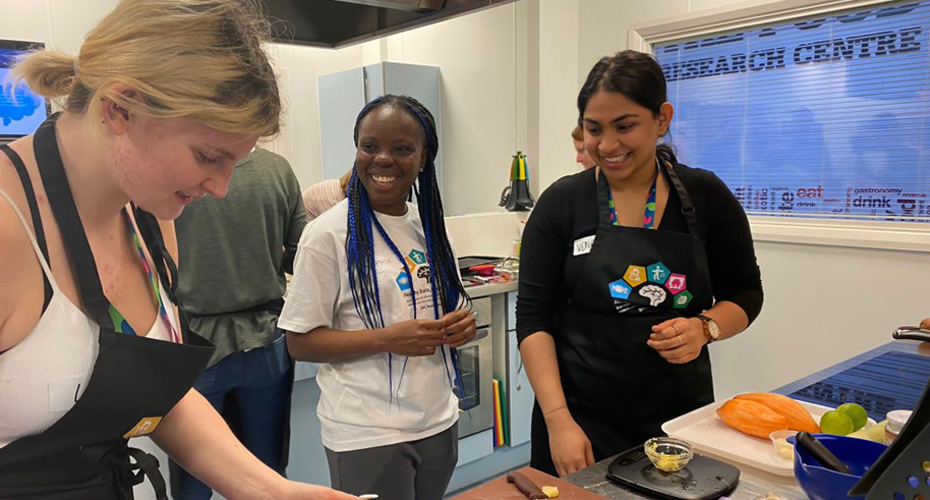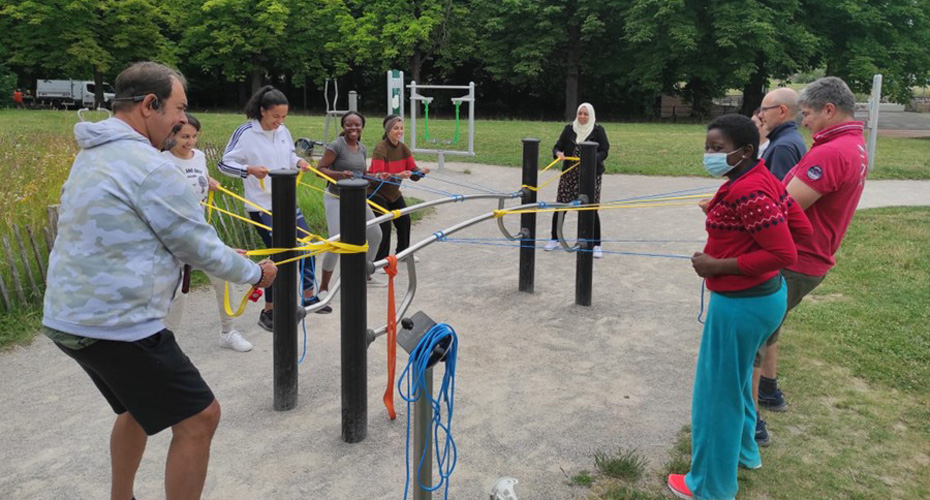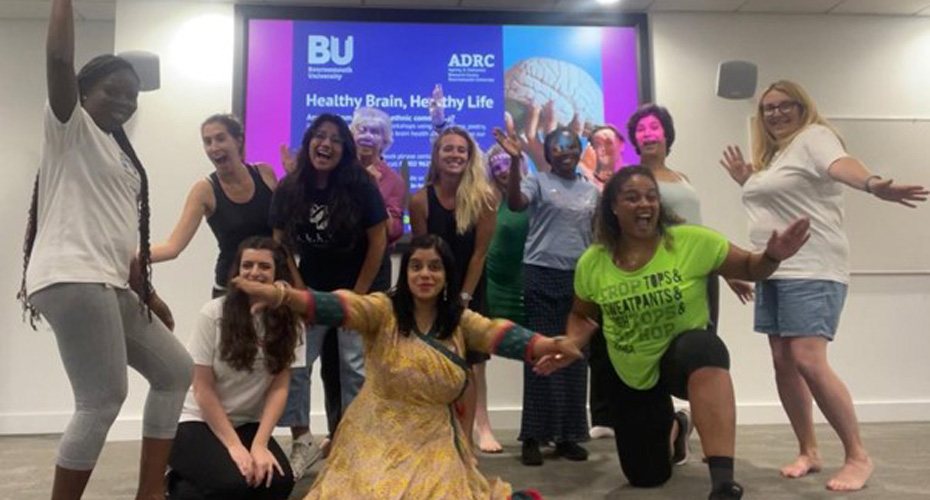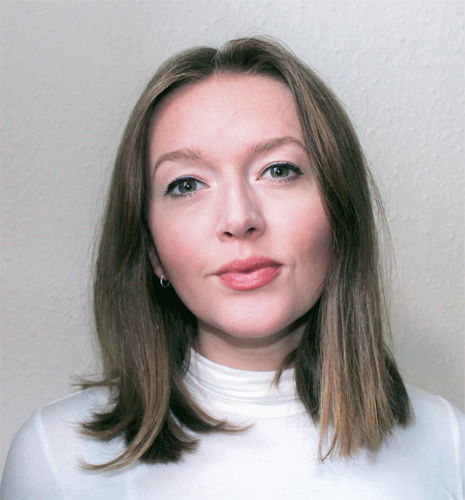Interview with a Soapbox Scientist: Dr Sophia D. Amenyah
Dr. Sophia D. Amenyah
Dr. Sophia D. Amenyah
Dr. Sophia D. Amenyah
Have you ever wondered how true the saying “you are what you eat” is? I sat down with Dr Sophia D. Amenyah, a researcher at Bournemouth University and registered nutritionist, who told me that this statement is backed up by the latest scientific research. “When you eat, the nutrients from your food tags onto the DNA in your cells. This can cause genes – strings of DNA that encode messages our bodies then use to function – to be turned on or off.”
I ask Sophia what sort of direct influence this can have on a body, and she tells me that some foods can turn genes that control blood pressure on, which means you’re more likely to have a healthy blood pressure range. On the other hand, if you’re missing certain key nutrients from your diet, then important genes don’t function as they should. “This can lead to cancer or cardiovascular events. So, it is incredibly important to be aware of what you’re eating. We literally are what we eat, and food can be seen as a sort of preventative medicine.”

Dr Sophia Amenyah with some participants from the Healthy Brain Healthy Life Project, our traditional food & our community – healthy eating for brain health workshop. Photo credit: Healthy Brain Healthy Life Project team.
"It’s not as simple as just telling people what to eat to have a better chance at living a longer, healthier life. What we eat is largely governed by culture and by socio-economic circumstance."
While Sophia worked on the molecular side of nutrition for her PhD at Ulster University, she came to realise that her passion lies in making a difference to the lives of others. This meant looking beyond food science and biology alone. “You see, it’s not as simple as just telling people what to eat to have a better chance at living a longer, healthier life,” she tells me. “What we eat is largely governed by culture and by socio-economic circumstance. If you have no money to buy good food, or you don’t own a fridge or freezer so you can’t eat fresh food, or you live in an area where you don’t have easy access to places for physical activity, it’s no use somebody telling you to eat better and keep more active. There are barriers in place meaning that is very difficult.”
Since her PhD, Sophia has been working as a Postdoctoral Research Fellow at the intersection of nutrition science, community engagement, sociology and policy in order to try to make a real difference to people’s lives. “I take everything I have learnt from my background in nutrition science, and I use that to help find ways to improve people’s quality of life.” She tells me that she is especially driven to help people improve their health in underserved communities, where diseases such as high blood pressure, cancer and cardiovascular disease are particularly prevalent. “And,” she adds, “it is so important that we think about this now, in the current cost of living crisis. People don’t have as much money to buy healthier food options, or even to spend money on the fuel to cook food. We need to figure out how to keep people eating as healthily as they can despite this.”
To try to understand the best ways to help people in underserved communities, Sophia works on a variety of projects that involve assessing the impact that different interventions have on people’s eating and physical activity – and thus, on their overall health. For example, she has worked on a research project that analysed whether participating in cooking lessons, a community garden, and other health and wellbeing activities might improve the health of people from a disadvantaged community. Beyond food and keeping active, this programme also gave classes on soft skills and employability. Sophia said these interventions had a measurable and positive impact on people’s behaviour and health, which could translate – in the long-term – to longer, healthier lives.

Dr Sophia Amenyah with participants in the ASPIRE project during a physical activity session. Photo credit: ASPIRE Project team, France.
Sophia tells me that a challenge with this research is knowing which interventions to test out in the first place. “A problem this research area has had in the past is that researchers haven’t taken the opinions, culture and lifestyle of the people they are trying to serve into account. What I focus on is co-creation. I start a conversation with members of the community, and we brainstorm together. Then, when I write my research proposals, I know I am proposing interventions that people in the community think might actually make a difference. It’s about listening and responding to the people we’re working with – we want to break down barriers and get their voices heard.”
Of course, this level of co-creation can sometimes be challenging. “Working with people is not always easy,” Sophia says, “but to know I am solving real-world problems, and helping people directly, is so important. One of the best parts of my job is the appreciation from the community.”
The other key highlight of her job is acting as a role model to Black children and teenagers, and to girls and young women. “It is so important for young people to see someone who looks like them in these sorts of careers. Even if a child doesn’t want to become a scientist, if they see someone who looks like them doing well in a career, they know they can do that too, in whatever field they choose.”
When she was growing up, Sophia’s scientific superhero was Professor Irene Ayi, a parasitologist. “I admired her work, and she was a woman in science who had a lovely family and could balance it all. Having someone who looks like you, doing something you want to do, makes things so much more relatable. It makes you believe you can get there.”
Sophia’s research has led her from the lab to working directly with the people who will benefit most from her work. I am struck by her drive to improve other people’s lives. “I hope someone, someday, can look up to me in the way I looked up to Professor Ayi. I don’t want anyone to feel that a career is unattainable,” she tells me. I have a hunch there are already many people who look up to Sophia – her passion for helping others is inspirational.

Dr Sophia Amenyah with some participants from the Healthy Brain Healthy Life Project Music & Movement workshop. Photo credit: Healthy Brain Healthy Life Project team.
If you'd like to read more about Sophia's recent research projects, you can follow the links below:
- Healthy Brain Healthy Life
- Inequalities in Nutrition & Healthy Ageing for older African adults
- Adding to Social capital and individual Potential In disadvantaged REgions (ASPIRE)"
Interview by Beki Hooper.

About the Author
Beki Hooper is a freelance writer and researcher, with a PhD in animal cognition. Her science writing has appeared in numerous publications, including The Conversation, BOU Magazine and Psychology Today, where she writes a blog about the minds, relationships and behaviours of animals. She is also a Pushcart Prize nominated poet, with poems published and upcoming in multiple international literary magazines and anthologies. She lives in Devon, and when she isn't writing she is most often found wandering Dartmoor or swimming in the sea. You can follow her on Twitter @BekiHooper.
